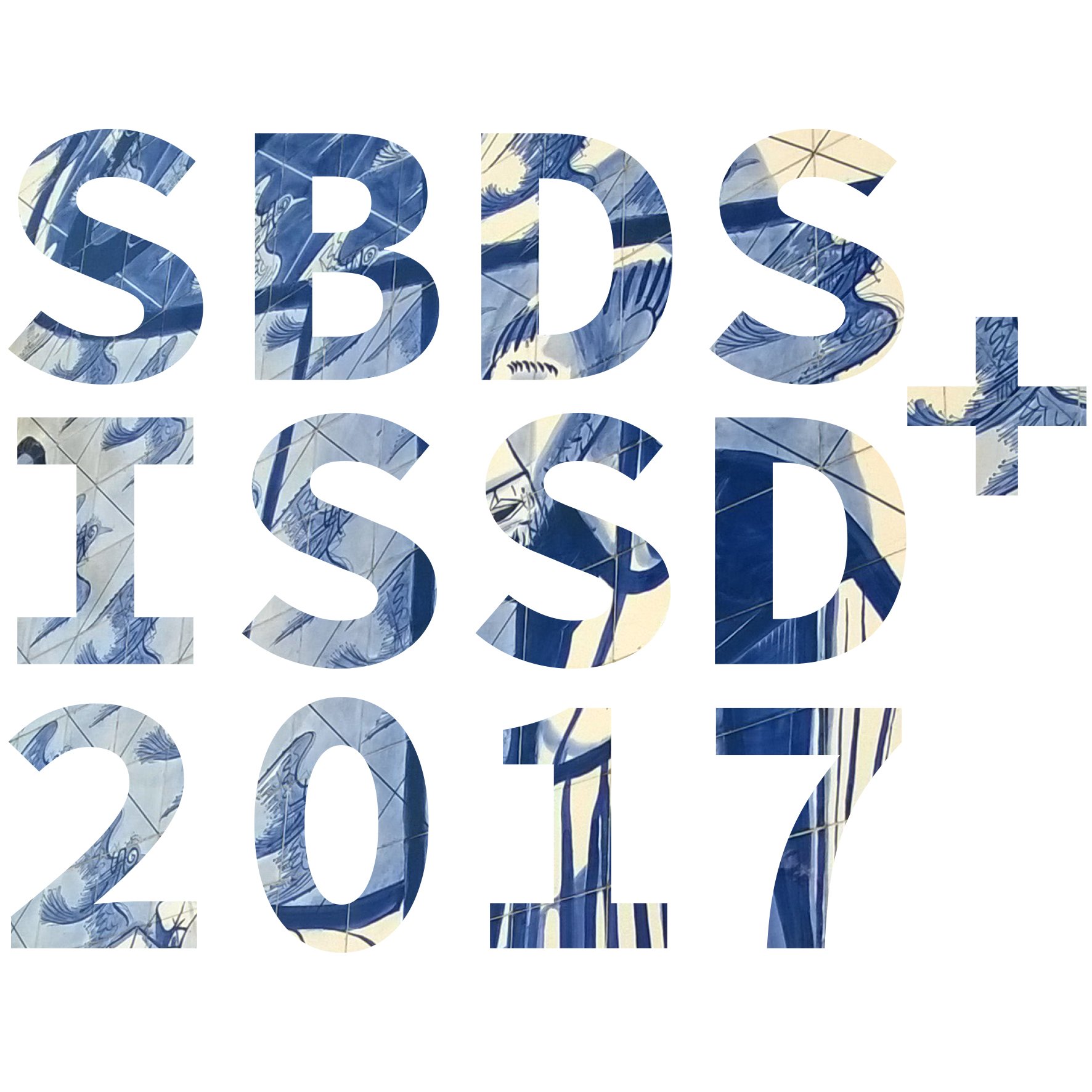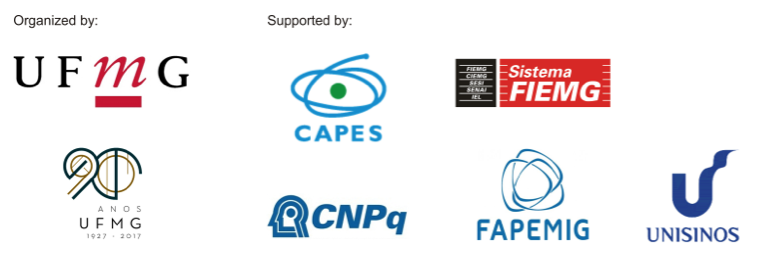
Technical Sessions and Roundtables:
UFMG School of Architecture
Rua Paraíba, 697 - Savassi
30130-141 Belo Horizonte - MGOpening ceremony:
FIEMG Conference Room
Av. do Contorno, 4456 - Funcionários
30110-028 Belo Horizonte - MG
Site do evento
Comissão organizadora
Você participou do Comitê Organizador desse evento?
Clique aqui.
Agosto 2017 vol. 3 num. 6
SBDS + ISSD 2017
Social innovation and collaborative models
Artigo Completo- Open Access
Design and social sustainability: new perspectives for the contemporary city based on participation
PDF - p.1-5
Artigo Completo- Open Access
Strategies to promote sustainable behaviour in relation to water use: ideas and classifications
PDF - p.6-13
Artigo Completo- Open Access
Radical Design for Sustainability: ‘Personal Meaning’ as the Fourth Bottom Line in Stuart Walker
PDF - p.14-20
Artigo Completo- Open Access
Design for Social Innovation: Distributed Economy, Collaborative Network and Creative Communities
PDF - p.21-24
Artigo Completo- Open Access
PDF - p.25-30
Artigo Completo- Open Access
Design for the Transition Movement: Designing a Post-Consumer Society
PDF - p.31-36
Artigo Completo- Open Access
Design-based approaches to engage youth in the transition to sustainability
PDF - p.37-41
Artigo Completo- Open Access
PDF - p.42-47
Artigo Completo- Open Access
PDF - p.48-53
Artigo Completo- Open Access
Coworking and design: a social innovation case study
PDF - p.54-59
Artigo Cometo- Open Access
PDF - p.60-66
Artigo Completo- Open Access
Design for social innovation between university and the broader society: a mutual learning process
PDF - p.67-75
Artigo Completo- Open Access
ICONOGRAPHY OF GOIANA: a participative approach in the search for a shared design project
PDF - p.76-81
Environmental labelling
Artigo Completo- Open Access
Sustainable Buildings and Interior Design
PDF - p.82-87
Artigo Completo- Open Access
Carbon footprint of pre-fabricated wood buildings
PDF - p.88-95
Artigo Completo- Open Access
Fashion and Sustainability: the aesthetics of upcycling and Mana Bernardes’s design
PDF - p.96-99
Artigo Completo- Open Access
FLOWS – A Design-based Process Model for Value Innovation from solid waste
PDF - p.100-108
Artigo Completo- Open Access
Environmental Parameters for Ecodesign (EPE): applying the tool on paper products
PDF - p.109-114
Artigo Completo- Open Access
Indicators of sustainability applied to interior design: rethinking the IDSRS model
PDF - p.115-119
Artigo Completo- Open Access
Problematization and Awareness of the Jeans Life Cycle
PDF - p.120-125
Artigo Completo- Open Access
Development proposal for a sustainable sanitary pad
PDF - p.126-132
Artigo Completo- Open Access
Environmental Labelling and Communication Design
PDF - p.133-139
Artigo Completo- Open Access
Certifications for Sustainable Buildings in Brazil: Comparative Study on Quantity of Certifications
PDF - p.140-143
Design, territory and culture
Artigo Completo- Open Access
PDF - p.144-148
Artigo Completo- Open Access
PDF - p.149-155
Artigo Completo- Open Access
Between the river and the road: Design and territory in Abaetetuba/Pará/Brazil
PDF - p.156-163
Artigo Completo- Open Access
PDF - p.164-170
Artigo Completo- Open Access
The role of sustainable development in the construction of the city image
PDF - p.171-176
Ecomaterials
Artigo Completo- Open Access
PDF - p.177-183
Artigo Completo- Open Access
Phytoremediation: An Urban Landscape Strategy for Sustainable and Healthy Cities
PDF - p.184-190
Artigo Completo- Open Access
Mutirão in cob houses building process: advantages and limitations
PDF - p.191-196
Artigo Completo- Open Access
PDF - p.197-206
Artigo Completo- Open Access
The role of the user experience on sustainable aspects of Product Design
PDF - p.207-210
Design and craftwork
Artigo Completo- Open Access
PDF - p.211-215
Artigo Completo- Open Access
PDF - p.216-219
Artigo Completo- Open Access
PDF - p.220-225
Artigo Completo- Open Access
Crochet - a knowhow of cultural heritage: tradition, handcrafts, and income generation
PDF - p.226-231
Artigo Completo- Open Access
Ways of doing: exercising dialogues between design, handicraft and social innovation
PDF - p.232-239
Circular economy
Artigo Completo- Open Access
PDF - p.240-245
Artigo Completo- Open Access
“SUCANECOS”: a sustainable design animated forms theater
PDF - p.246-254
Artigo Completo- Open Access
Canopy walking as a proposal for the açaí harvest in Amazonas
PDF - p.255-260
Artigo Completo- Open Access
Distributed economies through open design and digital manufacturing
PDF - p.261-267
Artigo Completo- Open Access
Sustainable Product Service Systems Design: Tools for Strategic Analysis
PDF - p.268-274
In 2017, from 1 to 4 August, in its sixth edition and celebrating its 10th anniversary, the SBDS+ISSD (Brazilian Symposium on Sustainable Design + International Symposium on Sustainable Design) was organized in Belo Horizonte-MG by the Built Environment and Sustainable Heritage Postgraduate Program and by the Department of Technology of Design, Architecture and Urbanism of the Federal University of Minas Gerais (UFMG). The event was part of the celebration of the 90th anniversary of UFMG.
The Brazilian Symposium on Sustainable Design (SBDS) and the International Symposium on Sustainable Design (ISSD) occur together every two years since 2007. The goal is to gather researchers, students and design professionals, as well as representatives of the productive and governmental sector, seeking to discuss the current situation and the future of design in regards to various aspects related to the sustainable development.
The first event took place in Curitiba-PR in 2007, organized by the Federal University of Paraná (UFPR). The second edition took place in 2009 in São Paulo-SP, organized by Anhembi Morumbi University. In 2011, the event took place in Recife-PE, organized by the Federal University of Pernambuco (UFPE). In 2013, it was jointly organized in Porto Alegre-RS by the Federal University of Rio Grande do Sul (UFRGS), University of Vale do Rio dos Sinos (Unisinos) and Ritter dos Reis University Center (UniRitter). In 2015, only the national version (SBDS) occurred in Rio de Janeiro-RJ, organized by the Pontifical Catholic University of Rio de Janeiro (PUC-Rio).
In this edition, the meeting was proposed as a place to exchange ideas and gain new knowledge in six topics defined under the triple bottom line (People, Planet, Profit):
- Social Pillar (people): Design, territory and culture / Social innovation and collaborative models
- Environmental Pillar (planet): Ecomaterials / Environmental labeling
- Economic Pillar (profit): Design and craftwork / Circular economy
Afternoons was reserved for the roundtables with the participation of expert speakers who have been working on the six topics of the Symposium. Each roundtable had the participation of researchers and professionals that could bring matters and contributions of the market and society, to broaden the debate. The work produced by the participants of the roundtables will be organized as a scientific article chapter to be published in a book.


